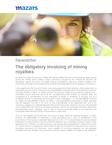
The obligatory invoicing of mining royalties
In this opportunity, the Council of State, even going against the Dian's doctrine, which states that it is required to issue an invoice "only for the commercialization of goods and for the rendering of services" (Concept 020585 of March 12, 1999) and that "the payment made by the producers exploiting non-renewable natural resources (Rnnr) to the corresponding public entities as royalties, does not correspond to a consideration for the acquisition of goods or rendering of services, but to a constitutional duty in accordance with the social function of property (...)" (Concept 089685 of March 12, 1999) (Concept 089685 of March 12, 1999). )" (Concept 089685 of November 3, 2009), indicated that the taxpayer incurred in an "error on the understanding of the applicable law" and in an "erroneous judgment of understanding derived from the Dian's own doctrine", since it is the law itself "which determined the invoice as the legal evidentiary rate for the proceeding of costs, deductions and deductible taxes". However, and in view of having proved the reality of the expenses, the Corporation determined the lifting of the penalty for inaccuracy.
Thus, for the adoption of this decision, the Council of State made the following syllogism: (i) Major premise: the deductibility of expenses, or their precedence as a cost, is conditioned to the presentation of the invoice or equivalent document (E.T. Art. 771-2) and all those who exercise liberal professions or sell products or services shall be obliged to issue and keep invoices of each of their operations (E.T. Art.615 ); (ii) Minor premise: only the operations established in Article 612-2 of the E.T (and in Article 2 of Regulatory Decree 1001 of 1997) do not require the issuance of an invoice or equivalent document; (iii) Conclusion: since royalties for mining concessions are not expressly exempted from the obligation to be invoiced, and since public entities are subject to this obligation, then the payment made for royalties that do not have such support, cannot be considered as deductible.
Several issues are worrisome from the above-mentioned ruling. Since mining royalties cannot be invoiced, they must be supported by an equivalent document. Given the change in the treatment of equivalent documents, and as analyzed by EY in a public concept addressed to the Colombian Mining Association, there would be two temporary scenarios for the deductibility of this expense: royalties paid until November 1, 2020 (which can be supported with the exploration and/or mining contract, and with the private liquidations) and those paid after that date, for which these documents will have no effect.
In this sense, the National Mining Agency will have to structure its internal protocols to issue the equivalent documents that, considering the provisions of Article 55 of Resolution 042/2020, allow the deductibility of such expense, to prevent the generation of a massive anti-legal damage for the mining companies.


